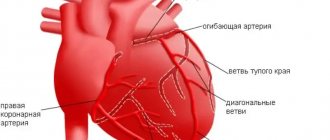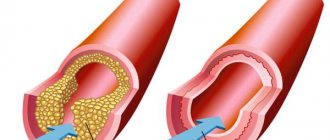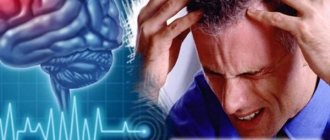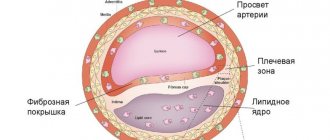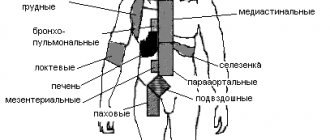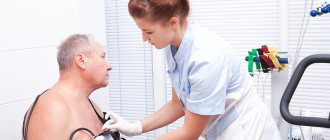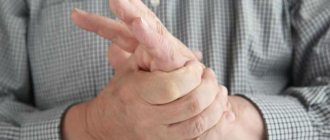11/15/2017 Hypertension is a persistent increase in blood pressure at rest to or above values: 140 systolic and 90 diastolic, or both. Until the high blood pressure becomes constant, or its values go much higher than 140/90, the patient usually does not feel any changes.
According to its etiology, arterial hypertension (AH), which is what hypertension is officially called in medicine, is divided into primary and secondary.
Primary hypertension occupies the largest percentage in the structure of morbidity, about 90% of cases. The cause of primary, also called essential, hypertension is unknown. There are many theories, Western medicine is inclined to the so-called “mosaic” theory of Irwin Page, its essence lies in the fact that at the beginning, an increase in blood pressure can be influenced by one factor, then subsequently many different influencing factors are already involved in the persistent maintenance of hypertension on the regulation of the circulatory system and water-salt balance. In Russia, preference is given to two concepts of neurogenic G.F. Langa-A.L. Myasnikov and membrane Yu.V. Postnova. In the first, the leading role is given to disorders of higher nervous activity, which leads to persistent excitation of the centers responsible for regulation in the cardiovascular system. In the second, membrane concept, hypertension is considered not as a breakdown in the regulatory system, but as a compensation mechanism for membrane disorders. Despite multi-volume descriptions of theories, the etiology of hypertension remains unclear, and the spread of the disease increases from year to year. According to foreign authors, about 50 million people suffer from hypertension in the United States; in Russia, according to statistics, the disease is detected in an average of 26% of the population. Despite the measures taken for “adequate” treatment of hypertension, and budget injections to combat hypertension, the number of cases of hypertension is growing and the disease itself is gradually rejuvenating. Just a few months earlier, the Russian Ministry of Health recognized arterial hypertension as one of the four main diseases in the Russian Federation.
As for secondary hypertension, its etiology is directly related to the underlying concomitant disease; it can also be caused by excessive alcohol consumption, exposure to certain pharmacological drugs, including the use of oral contraceptives.
According to the classification, arterial hypertension is divided into:
- normal blood pressure is slightly less than or equal to 120/80 mm Hg. Art.,
- prehypertension (borderline state) 120-139/80-89,
- Stage I hypertension from 140 to 159 systolic blood pressure, or 90-99 diastolic
- Stage II, systolic 160, or diastolic 100.
Clinically, hypertension often does not manifest itself for a long time. Different authors can find such symptoms of initial hypertension as headaches, sweating, malaise, but all these symptoms are not considered pathognomonic signs of uncomplicated hypertension. The clinical picture begins to fully develop when complications arise in target organs.
One of the recorded signs of pathology is changes in the retina of the eye; according to the classification of Keys, Wegener and Barker, they are divided into 4 stages:
- Stage 1, constriction of arterioles,
- Stage 2 includes stage 1 + arteriolar sclerosis,
- Stage 3, hemorrhages and exudation in addition to stage 2,
- Stage 4, papilledema.
The main diagnostics is measuring blood pressure; other diagnostic methods are used to clarify the nature and extent of complications, i.e. target organ damage.
General approaches to the treatment of arterial hypertension include, first of all, blood pressure control and, if elevated values are detected, lifestyle changes are recommended. This, however, does not exclude that to prevent hypertension, you should follow some rules of a healthy lifestyle. Recommendations include giving up bad habits, such as smoking and limiting alcohol consumption, and following a diet rich in fruits, vegetables, and low-fat foods. Also reducing body weight to body mass index norms. And most importantly, regular physical activity in the fresh air is recommended; of course, you don’t need to immediately run to sign up for a gym or buy dumbbells, but 3-5 times a week for 30 minutes can be spent walking in the park, or walking several times a week from the metro to work. In the first stage, in the absence of target organ damage, such lifestyle changes can reduce blood pressure to target values without treatment.
If blood pressure does not drop below 140/90 after lifestyle changes, therapy should be started.
Let's briefly go over pharmacotherapy:
To correct arterial hypertension, antihypertensive drugs are prescribed. These include: diuretics, β-blockers, calcium channel blockers, ACE inhibitors, angiotensin II receptor blockers. In fact, each of these drugs should affect one of the links in the pathogenetic chain of the disease. In most cases, the patient is first prescribed one drug, if it is ineffective, it is changed to another, and so on in a circle. All drugs are toxic, each has many side effects and limitations, some drugs cannot be prescribed for concomitant diseases, others should be used with the addition of compensatory therapy. There is no consensus among doctors about which drug is best to start with; over time, research is carried out, some drugs are considered “anathema”, others, on the contrary, are brought to the fore; in parallel, there are fierce debates and searches for the true causes of primary arterial hypertension. And yet, this does not make patients feel better; according to foreign authors, blood pressure during therapy decreases to target levels (>140/>90) in only a third of patients. It should be noted that pharmacological treatment with antihypertensive drugs is lifelong. If the course is abruptly cancelled, the pressure often rises above the numbers that were initially recorded in the anamnesis.
Treatment of arterial hypertension with homeopathy most often begins after completing courses of all antihypertensive drugs, when the patient gets tired of taking pills, or when the side effects already more than cover the benefits of the so-called therapy. The picture of true arterial hypertension is usually already heavily blurred by pharmacological drugs by the time the homeopath begins to work. In addition, drug complications in target organs are added to stages 1-2 of hypertension, which is associated with the difficulty of therapy and the inability to quickly reduce blood pressure and maintain it at target levels. Although it should be noted that more and more compatriots are learning about the method of homeopathy, trying to treat their diseases, getting a positive effect and no longer returning back to allopathy.
In homeotherapy, it is very important to collect a detailed history; the history itself, as well as its collection, differs significantly from what patients are accustomed to encounter when turning to allopaths. The homeopathic anamnesis consists of 4 components: a spontaneous story, a directed survey, an indirect survey, a biographical anamnesis and objective examination data. The lion's share of the appointment time is spent on finding out in the smallest detail all the symptoms that worry the patient and their exact characteristics. The goal of the homeopath at this stage is to collect the so-called “full symptoms”; the basis of such a symptom are the circumstances in which the complaints first appeared, the localization of the symptom, the nature of one’s own sensations (it is better for the patient to describe them in his own words) and modalities.
Symptom modalities are the signs in which the symptom appears, changes, intensifies, weakens, under the influence of what physical or mental factors this occurs. You can find out more and read in detail how a homeopathic treatment works here.
Basic homeopathic therapy for essential (primary) hypertension is based on the interrelationships of the patient’s mental, emotional and physical state; the selection of an individual homeopathic remedy includes the characteristics of the patient’s personality and constitution. To select the most similar drug, a classical homeopath takes into account both the physical manifestations of the disease and the individual characteristics of the patient’s personality and constitutional features.
Kent's repertory from 1916 provides 44 drugs for hypertension, the modern repertory already includes 139 drugs. In order to select such a drug, the symptoms of hypertension alone are not enough, or you will have to go through all 139 drugs one after another, which will simply be ineffective, because the treatment process will drag on for many years. Among the homeopathic medicines quite often prescribed for primary hypertension, one can find polychrests such as Argentum nitricum, Arsenicum album, Lycopodium, Nux vomica, Phosphorus, Sulfur, Thuja, etc.
The main symptoms when selecting a homeopathic medicine for the treatment of hypertension will be headaches and heart pain, their localization and modalities. Each homeopathic remedy, like a person, has its own individual characteristics, be it a certain location of headaches, the nature of heartbeats, fears, or its own way of coping with hypertension. For example, Argentum nitricum headaches are localized mainly either in the back of the head or in the left frontal region, these are pulling or boring pains that are relieved by strong rubbing or pressing, while the Arsenicum album remedy is characterized by burning pains without clear localization, intensity which are relieved by cold, and it is important to note that the Arsenicum album patient is very chilly, all other pains are relieved by warmth, and are stronger in the cold. Lycopodium throbbing pains, localized in the parietal region, better in open air and worse in warmth.
Argentum nitricum patients often experience dizziness with uncertainty when walking, especially in the dark. Heart complaints, as well as headaches, are relieved by pressure. They are characterized by the presence of fears: stroke, loneliness, close quarters, heights, death (Aconite often predicts the hour of their death).
Arsenicum album is characterized by nighttime palpitations accompanied by severe restlessness. Patients are afraid of suffocation at night, of thieves. The Arsenicum album patient is pedantic to detail, cannot tolerate disorder, and is extremely neat and tidy.
Lycopodium looks older than its age. History often includes diseases of the hepatobiliary system, kidney stones, and rheumatic disorders. Pain in the heart of a spasmodic nature, usually from 16.00 to 20.00.
Nux vomica is more often a masculine drug for overworked city dwellers leading a sedentary lifestyle. Nux vomica is an emetic nut that contains strychnine, which in toxic doses increases blood pressure due to vasospasm and an effect on cerebral vasomotor centers.
All of the above-described drugs illustrate the individual characteristics of each patient, which pushed medicine away from the general approach to individualization. It is, of course, not possible to consider the features of all homeopathic medicines used for arterial hypertension within the framework of one article; the method of homeopathy largely remains the art of the doctor to find the key to the disease in order to cure the patient.
Author: Kashtanova Natalya Yurievna
Phone numbers for appointments, +7 (915) 182-50-33
If, while reading the article, you discover any similar symptoms, do not self-medicate under any circumstances, trust the professionals, consult with a specialist.
Back
What to do with hypertension to improve the condition
Modern medicine can only offer drugs that can temporarily reduce blood pressure to normal age levels. If the problem has existed for a long time, just a few hours after taking life-saving pills, hypertension will manifest itself with renewed vigor. There is no chemistry that could save a person from cardiovascular disease forever.
Homeopathic alternative medicine compounds work on the whole body. Medicines differ from conventional chemical drugs in that they do not “treat” symptoms. The purpose of treatment: to improve the functions of a person’s internal systems, and thereby relieve him of various pathologies by normalizing the functioning of the body as a whole.
Will homeopathy help?
During the consultation, the homeopathic doctor interviews the patient for 1-2 hours. All important points are recorded:
- habits and lifestyle of the patient;
- character and level of emotional stability;
- body constitution and associated diseases.
The main task: to identify “problems”.
It may well turn out that the patient is mentally unstable (for example, the loss of a loved one or separation occurred not so long ago). In this case, the doctor will recommend medications to the patient that can restore the emotional background, and thereby “calm down” the worries. As a result, the pressure normalizes, high values will appear less and less often.
When to visit a homeopath
The following symptoms can indicate that a patient has hypertension:
- frequent headaches and migraines, dizziness;
- suddenly appearing pulsation of the veins in the temple area, which also suddenly stops;
- changes in heart rate, poor cardiogram readings;
- redness of the face for no apparent reason;
- numbness of the upper or lower extremities (partial);
- the appearance of “flies” before the eyes, pain.
Symptoms may appear together or separately.
Hypertension: treatment, symptoms, risk factors
Recommended treatment: Viskumel drops EDAS-137 (EDAS-937 granules)
Hypertensive heart disease is a disease caused by stable (sometimes periodically) high blood pressure (from 140/90 mm Hg or more).
The reasons for its occurrence can be different: endocrine, renal, cardiovascular, blood diseases, sedentary lifestyle, prolonged stress, emotional stress, poor heredity, the formation of atherosclerotic plaques, menopausal changes in the body, excess sodium, bad habits, obesity.
In addition to the above, certain medications contribute to the occurrence of hypertension (corticosteroids, tricyclic antidepressants, anatomical steroids, bronchodilators, etc.).
Symptoms of hypertension
Symptoms of hypertension may include:
- Dizziness
- Feeling of noise/ringing in the ears, double vision
- Shortness of breath and angina
- Nausea and vomiting
- Headache that can strike at any time of the day
- Reddish tint to the skin
- Nosebleeds
- The appearance of edema and rapid fatigue of the body
Degrees of hypertension
- degree, it is also called mild hypertension. The patient's blood pressure rises to 180/95-104 mmHg. Art. However, rest significantly normalizes blood pressure. Some patients complain of pain in the frontal part of the head, lethargy, difficulty falling asleep, and inability to concentrate.
- The degree is called borderline hypertension. Blood pressure at rest is in the range of 180-200/105-114 mm Hg. Art. The symptoms are expanding - the patient is worried about dizziness, headaches, discomfort in the chest (angina pain), vascular insufficiency, transient cerebral ischemia and cerebral strokes. Diagnostics show that the aorta and apex of the heart are affected, and the left ventricle/interventricular septum is hypertrophied.
- The degree is called severe hypertension. Increased number of vascular accidents caused by high blood pressure (200-230/115-129 mm Hg), progression of arteriolosclerosis. Blood pressure does not return to normal spontaneously. The heart, brain, kidneys and fundus of the eye are affected. All this can be expressed by myocardial infarction, arrhythmia, angina pectoris, insufficient blood circulation, encephalopathy, hemorrhagic and ischemic infarctions, decreased filtration and blood flow in the kidneys, angioretinopathy.
- The degree is called isolated systolic hypertension. Due to a decrease in vascular elasticity, the patient experiences sharp changes in systolic and diastolic pressure (140/90 mm Hg). Frequent hypertensive crises (painful critical conditions caused by excessively high blood pressure, accompanied by dizziness), which can lead to loss of consciousness or lead to life-threatening complications. High probability of death.
Groups and risk factors for the occurrence and development of hypertension.
— Frequent stress means high levels of adrenaline in the blood.
- Nicotine addiction.
- Excess body weight.
— Hormonal contraceptives.
— Excess salt and, as a result, sodium and fluid retention, increasing swelling.
- Menopause.
— Age-related changes (wear and tear of the cardiovascular system).
Prevention of hypertension.
The following measures will help you reduce the risk of developing and developing hypertension.
- Regular physical activity to maintain vascular tone
- Weight control, healthy and balanced diet to avoid obesity
- Quitting bad habits (especially nicotine addiction, because it provokes vasoconstriction)
- Maintaining the correct daily routine, avoiding overwork, timely rest during physical and mental stress
- Controlling blood sugar levels
- Blood pressure tracking
- Systematically do a heart cardiogram
Treatment of hypertension
Treatment must be comprehensive. At the same time, drugs that lower blood pressure, dilate blood vessels, and diuretics are used. Taking sedative medications is also recommended. The selection must be individual and take into account the patient’s health status. It is necessary to follow a diet aimed at reducing the consumption of salt and liquids; alcoholic beverages are strictly contraindicated.
Treatment with folk remedies involves drinking teas from hawthorn, valerian, chamomile, peppermint, and lemon balm. These plants calm, reduce emotional stress, but do not cause drowsiness. You can reduce blood pressure at an early stage with honey, citrus fruits, rose hips and green tea. More serious stages require immediate consultation with a doctor and a full diagnosis to choose the right treatment method.
Recommended treatment: Viskumel drops EDAS-137 (EDAS-937 granules)

